
Think the Pentagon was ill-prepared and stumbled after it invaded Iraq and Afghanistan? Think you could have drafted a better war plan?
Well, the U.S. Department of Defense may agree with you. That’s why it said late Thursday that it’s seeking a “crowd-sourcing entity,” mostly likely a contractor, to chart “the types of future challenges to national security for which the President of the United States would expect U.S. armed forces to have the ability to address.”
The Pentagon wants the winning bidder to brainstorm online with “a large and diverse group of people collaborating in real time” to improve how the nation prepares for, and fights, its wars.
Crowdsourcing is the 21st Century’s version of putting our heads together, via the Internet, to tackle a problem and come up with the best solution. Instead of a handful of experts—war-planners, for example—it relies on a constellation of thousands or more individuals, often unpaid, who funnel their ideas into a central clearinghouse, where the optimum ones supposedly float to the surface.
The military is already using crowdsourcing on a more limited scale, to design a next-generation combat vehicle and considering its potential to help track nuclear proliferation.
But this latest proposal could put crowdsourcing’s fruits inside the Tank, the top-secret Pentagon lair where the nation’s senior generals and admirals train, equip and conduct the nation’s wars.
The Defense Department stresses that the crowdsourcerer it hires will only “enhance the Department’s understanding of the future security environment” and won’t actually be drafting war plans. But it’s encouraging creative thinking: “An understanding of a range of alternative futures and the types of national security challenges they may present is necessary to inform strategy development and force planning analysis within the Office of the Under Secretary of Defense [for] Policy.”
The Pentagon wants the “crowd-sourcing entity” to produce these three “Performance Objectives”:
a. Identify alternative futures and global and regional security environments in the 2020-2025 timeframe that considers military, sociological, economic, scientific, technological, and environmental trends and potential shocks with implications for the Department.
b. Generate innovative scenarios that present pathways to a crisis or conflict that is antithetical to U.S. national security interests. Scenarios will provide a narrative description that captures a representative potential future national security challenge and includes the following key elements: identity of key actors, their interests and objectives, primary drivers to conflict and rationale for key actors’ decision-making and actions, key capabilities they could use in a crisis or conflict, description of representative activities they would take (i.e., the manner in which they would use their capabilities to achieve their objectives), and role of third parties. Scenarios should remain within the bounds of plausibility.
c. Develop and provide quick-turn analyses exploring the implications for the Department on new and/or potentially game-changing military capabilities of the adversary identified in the alternative futures environment and/or the innovative scenarios to inform the development of alternative strategies and force planning options to mitigate the impacts of the capabilities.
“There is no requirement for the work to be conducted at the Pentagon,” the solicitation adds, “with the exception of periodic briefings of deliverables as stated in the Performance Objectives.”
If you’re interested in helping hone the nation’s future war-fighting environment, you’d better get cracking. The Pentagon is seeking a three-year deal beginning next month, and the deadline to apply is Sept. 4. “A written notice of award or acceptance of an offer, mailed or otherwise furnished to the successful offeror within the time for acceptance specified in the offer, shall result in a binding contract without further action by either party,” the Pentagon adds. The winner will not have access to classified information, which could help things.
The solicitation warns that it may reject any bidder whose offer “is evaluated to be unrealistic in terms of program commitments, including contract terms and conditions, or unrealistically high or low in cost/price when compared to Government estimates, such that the proposal is deemed to reflect an inherent lack of competence or failure to comprehend the complexity and risks of the program.”
“An inherent lack of competence or failure to comprehend the complexity and risks of the program?” Talk about unilateral disarmament. Such a requirement would have kept the wars in Afghanistan and Iraq on the drawing boards.
More Must-Reads from TIME
- Donald Trump Is TIME's 2024 Person of the Year
- Why We Chose Trump as Person of the Year
- Is Intermittent Fasting Good or Bad for You?
- The 100 Must-Read Books of 2024
- The 20 Best Christmas TV Episodes
- Column: If Optimism Feels Ridiculous Now, Try Hope
- The Future of Climate Action Is Trade Policy
- Merle Bombardieri Is Helping People Make the Baby Decision
Contact us at letters@time.com